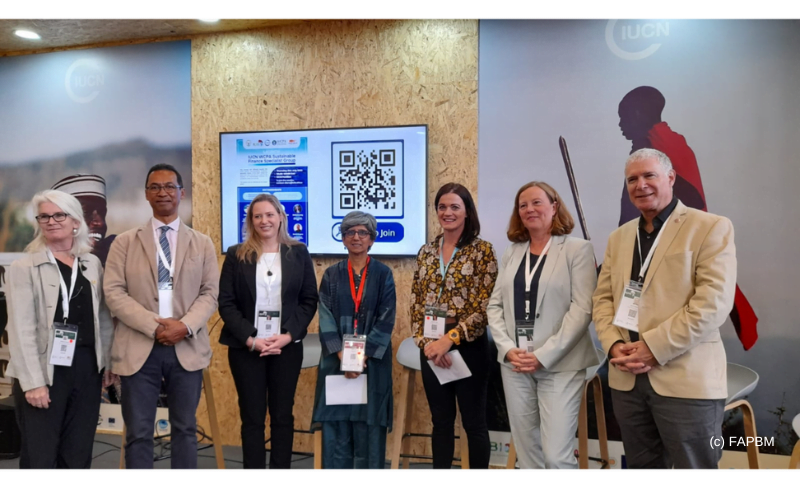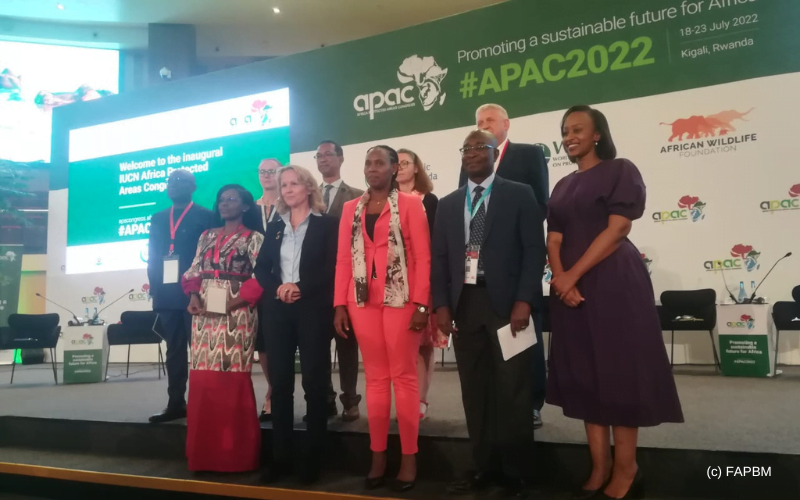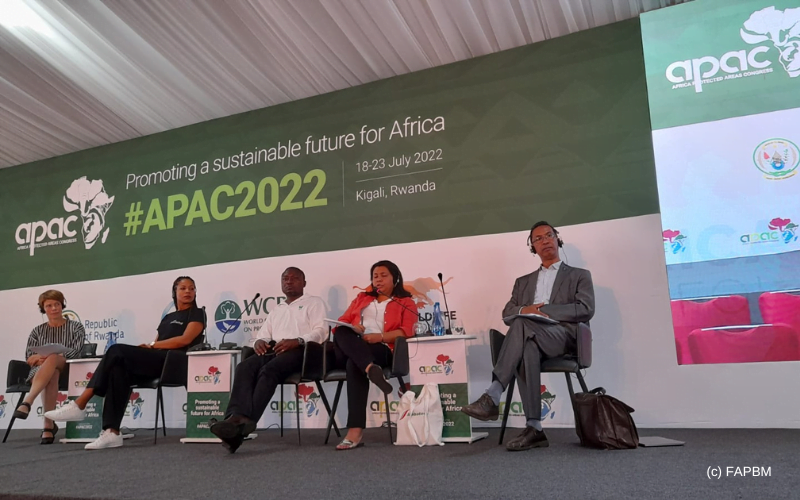
FAPBM was present at the first African Protected Areas Congress, APAC which took place in Kigali (Rwanda) on 18-22 July 2022. Invited to take part in several discussions, the Executive Director repeatedly highlighted the urgency of increasing funding for countries with some of the most exceptional, yet threatened, biodiversity. He put forward sustainable funding through conservation trust funds (CTFs) and the mobilization of the private sector as priority avenues. His agenda included panels on the following topics:
- July 19 at 16.00: Impacts of COVID-19 and other pandemics in protected and conserved areas;
- July 20 at 08.30: Investing in Biodiversity: Diversifying Innovative Financing Models for Protected and Conserved Areas;
- July 20 at 10:00 am: Supporting progress towards national biodiversity targets through improved mitigation policies and outcomes (COMBO+);
- July 20 at 10.30: Strengthening financial resilience of communities and their protected areas;
- July 21: Launch of the IUCN WCPA (World Conservation and Protected Areas) Sustainable Funding Specialist Group;
- 22 July at 08.30: The economic contribution of protected areas.
FAPBM stressed the message of the Malagasy delegation, oriented on the proven and effective governance models in protected areas. With a network of protected areas that covers nearly 10% of its surface (against a world average of 15%), the Great Island was worthily represented, among others by Ambatovy, Indri, Biodev, Fanamby, MNP, NGO Guides of Andasibe, the MIHARI Network, Rainforest Trust, RCOI, Tafo mihavo, WCS, WWF, and Wildfowl & Wetlands Trust (WWT), … The exchanges resulted in a series of recommendations that were submitted to consolidate the Kigali Call to Action, a commitment of all present stakeholders.

The call to action and after,
“Africa’s protected and preserved areas contribute significantly to economic development at local and national levels, generating services that support surrounding productive landscapes and seascapes, and supporting the livelihoods of local communities through sustainable use and employment, particularly through tourism. Nevertheless, many PAs are under-resourced for their effective management.” To address this, the Kigali Call to Action calls for, among other things, request that:
- African governments take strong lead in integrating environmental priorities in economic and financial planning;
- Urgent action be taken to address the substantial under-resourcing of protected and conserved areas in Africa, through a range of instruments, including increased government funding, public-private partnerships, trust funds and innovative funding mechanisms, such as carbon trading;
- Investments be scaled up through appropriate and diversified funding mechanisms such as those announced at Congress, including the African-Protected Areas Conservation Trust (A-PACT), the Nature
- Africa program and the Global Environment Facility’s Africa programming.
The members of the Consortium of African Environmental Funds (CAFÉ) who were present highlighted the best practices of national conservation trust funds. Through joint or separate interventions, they shared their local experiences. For example, FAPBM and Biofund, both members of the COMBO+ project, presented their approaches to involving the private sector in biodiversity financing on the panel “Supporting progress towards national biodiversity targets by improving mitigation policies and outcomes”. Then, at the invitation of the African Wildlife Fund, FAPBM joined CAFÉ members for the pre-launch of the A-PACT, as well as the launch of the IUCN Sustainable Funding Working Group, which was also an opportunity to connect.
The Congress brought together a total of 7,455 participants (2,455 physical participants and 5,000 virtual participants) with representation from 53 of the 54 African countries and 80 countries worldwide. It highlighted priority actions to strengthen protected and conserved areas, and recommendations for accelerated implementation of the 2030 Agenda for Sustainable Development. The Kigali Call to Action will feed into the resolutions of COP15-Biodiversity (December, Canada) and the United Nations Framework Convention on Climate Change.





